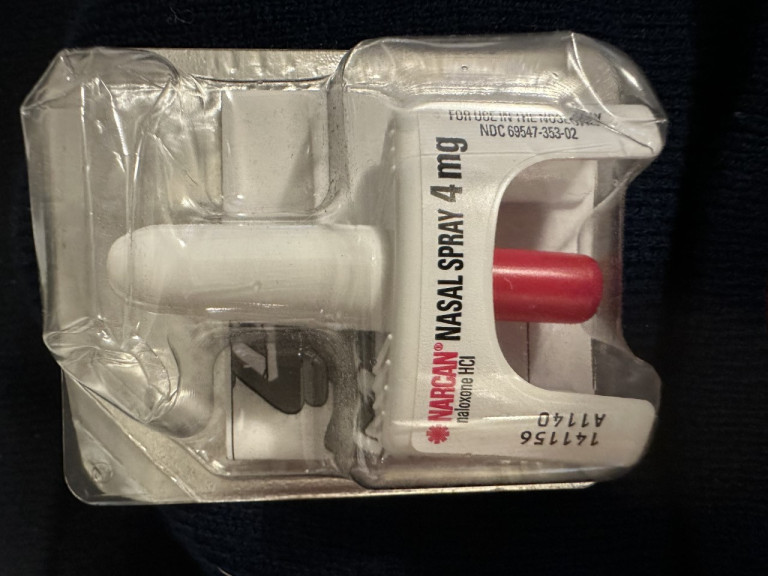U of I plans to increase Narcan availability and education

A single dose of Naloxone nasal spray. March 29, the U.S. Food and Drug Administration approved this form of Naloxone for over-the-counter use. Photo courtesy of Brain Brauer
University of Illinois police said they are adding Naloxone kits to all public heart defibrillator boxes on campus by the Fall 2023 semester.
The kits containing Naloxone, often known by the brand name “Narcan”, were gifted to campus police by the Division of Public Health and are in the form of a nose spray. They are used to save a person who is experiencing an opioid overdose from dying.
March 29, the U.S. Food and Drug Administration approved Narcan for over-the-counter use, making it the first opioid-treatment drug available without a prescription.
Brian Brauer, Executive Director of Emergency Management at the university, said that this approval will save the lives of people experiencing an overdose.
“By introducing this medication into the civilian world, we're adding one more opportunity where someone who's in a crisis because of opioids can receive this life saving medication before the professional rescuers can get there,” Brauer said.
As soon as someone has stopped breathing from an overdose, they have four minutes before they will have irreversible brain damage, according to Brauer.
“This medication can bridge that gap between when the person has a crisis and when the first responders arrive,” Brauer said.
Brauer also said that even if someone is unresponsive from something other than an overdose, there is no risk to administering Narcan. He recommended starting with chest compressions, pausing to administer Narcan and eventually using an AED if needed while waiting for first responders.
“One of the challenges right now is the Heart Association, who writes the CPR standards hasn't integrated Narcan into their standard yet,” Brauer said. “If someone's in cardiac arrest because they had an arrhythmia, and you administer Narcan, that's not going to hurt them.”
As Narcan is becoming increasingly available to the public, the university is expanding its education on how to use it.
The ACE IT workshop is a drug and alcohol education program required for first year and transfer students at the university. Naloxone education will be added to the workshop this summer.
Kristin Manzi, the coordinator of ACE IT, talked about the role of the workshop when information on drugs evolves.
“Drug and alcohol educators know that the field is always changing,” Manzi said. “We can say, ‘hey, and if you're a new student, this is another resource you might want to know about.’”
Manzi also said that abstinence education for drugs has been proven to be ineffective because many students will still use drugs and alcohol. She said she wants students to be able to know what to do in the case of a drug emergency.
“Substances are out there, and students are going to experiment.” Manzi said. “I kind of think of it as you'd rather have it and not need it than need it and be waiting on an ambulance when it could benefit the person.”

